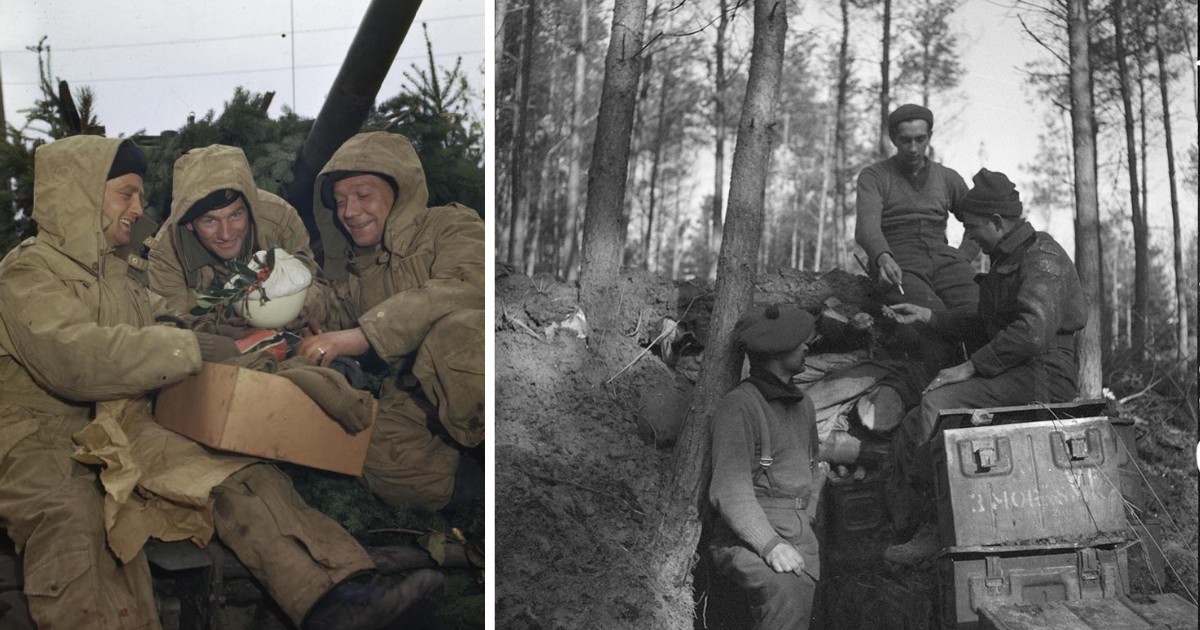The harsh conditions at the front
In November 1944, after the Battle of the Scheldt, the Canadian 1st Army took over a significant portion of the front sector from the British 2nd Army. This extended the Canadian front line to over two hundred kilometres in the ensuing months. Canadian soldiers had to withstand fierce German counterattacks, artillery bombardments, and the hardships of unfavourable weather. The static front in the Netherlands was marked by severe weather conditions, with weeks of rain in October and November, followed by a harsh winter that hadn’t been seen in years.
Amidst the icy cold and the tensions of war, Canadian soldiers tried to bring a touch of warmth and humanity to the harsh conditions at the front. Despite the hardships and the danger surrounding them, many managed to create a sense of camaraderie and solidarity on this festive evening. Candles were lit in makeshift shelters, and improvised Christmas decorations were hung. Soldiers shared their meagre supplies, attempting to create a festive atmosphere amidst the harshness of war. For many, it was a moment of reflection, letting their thoughts drift to loved ones at home and the peace they hoped to restore.
Christmas at the front
Canadian soldiers would remember Christmas 1944 as a day when a kind of truce seemed to prevail on their side of the front. On the morning of December 24, the 4th Canadian Infantry Brigade received reports from the Royal Regiment of Canada that German troops in nearby trenches were singing Christmas carols from their front positions. On the frontline, it seemed as if both the Allies and German troops had decided to call off everything as if this day rose above the horrors of war. It was an unexpected day of unity and brotherhood, where silence spoke, and peace, albeit temporarily, spread across the battlefield. According to the War Diary of the Calgary Highlanders, they were surprised on Christmas Eve by German frontline troops playing accordion and horn. A symphonic gesture that was answered with a salvo of rifles, Stens, Brens, grenades, and mortars from the Canadian side.
Some units of the Canadian The Toronto Scottish also celebrated Christmas in the Dutch town of Groesbeek. On December 25, 1944, officers, as usual, served Christmas dinner to non-commissioned officers and enlisted men. The night before Christmas, the Canadians sang ‘Silent Night’ outdoors, and to everyone’s surprise, the Germans on the other side of the front started singing ‘Stille Nacht’.
Amid the cold and silent night at the front in Groesbeek, the Régiment de la Chaudière unconventionally disrupted the peace on Christmas Eve. J. Armand, a regiment member, shared his experience of a remarkable episode where mortar shells and music formed an unexpected symphony: “On Christmas Eve, we were close to the Germans, they weren’t patrolling, and we heard they were having a few drinks. At midnight, they played Christmas carols through a loudspeaker. In response, I decided to react with a few mortar shells, just to let them know we were still not friends.” However, the reaction to the mortar fire was as remarkable as it was unexpected. After the threatening sound of explosions, the Germans played ‘Lili Marleen,’ after which the music suddenly fell silent. Despite the tense situation, men on both sides of the front longed for home, resulting in a moment of shared humanity. “All our men were Catholic, and the chaplain walked with the communion from trench to trench,” J. Armand adds.
